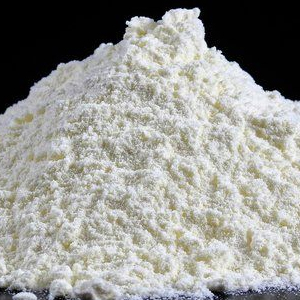
Potassium, Hydrogen Carbonate, Ph Eur
KHCO3 100.1 298-14-6
DEFINITION
Content: 99.0 per cent to 101.0 per cent.
CHARACTERS
Appearance: White or almost white, crystalline powder or colourless crystals.
Solubility: Freely soluble in water, practically insoluble in ethanol (96 per cent).
When heated in the dry state or in solution, it is gradually converted to potassium carbonate.
IDENTIFICATION
A. To 5 mL of solution S (see Tests) add 0.1 mL of PhPh solution. A pale pink
colour is produced. Heat; gas is evolved and the colour becomes red.
B. It gives the reaction of carbonates and bicarbonates.
C. 1 mL of solution S gives reaction (b) of potassium.
TESTS
Solution S: Dissolve 5.0 g in 90 mL of carbon dioxide-free water prepared from distilled water and dilute to 100 mL with the same solvent.
Appearance of solution: Solution S is clear and colourless.
Carbonates: The pH of freshly prepared solution S is not greater than 8.6.
Chlorides: Maximum 150 ppm.
Sulfates: Maximum 150 ppm.
Ammonium: Maximum 20 ppm.
Calcium: Maximum 100 ppm.
Iron: Maximum 20 ppm, determined on solution S.
Sodium: Maximum 0.5 per cent.
Atomic emission spectrometry: To pass the test.
Heavy metals: Maximum 10 ppm.
ASSAY
Dissolve 0.800 g in 50 mL of carbon dioxide-free water. Add 0.1 mL of methyl orange solution. Titrate with 1 M hydrochloric acid until the yellow colour begins to change to yellowish-pink. Heat cautiously and boil for at least 2 min. The solution becomes yellow. Cool and titrate until a yellowish-red colour is obtained.
1 mL of 1 M hydrochloric acid is equivalent to 0.1001 g of KHCO3.
KHCO3 100.12
Carbonic acid, monopotassium salt.
Monopotassium carbonate [298-14-6].
Potassium Bicarbonate contains not less than 99.5 percent and not more than 101.5 percent of KHCO3, calculated on the dried basis.
Identification: A solution (1 in 10) responds to the tests for Potassium and for Bicarbonate .
Loss on drying: Dry it over silica gel for 4 hours: it loses not more than 0.3% of its weight.
Normal carbonate: Grind 3.0 g of Potassium Bicarbonate with 25 mL of alcohol and 5 mL of water in a porcelain mortar. Add 3 drops of PhPh TS, and titrate slowly with barium chloride solution, prepared by dissolving 12.216 g of barium chloride in 300 mL of water and diluting with alcohol to obtain 1000 mL of solution, until the suspension becomes colorless. Continue the grinding for 2 minutes, and if the color turns pink, continue the titration with the barium chloride solution to a colorless end-point. Repeat the grinding for 2 minutes and the addition of the barium chloride solution, if necessary, until the suspension is colorless after 2 minutes of grinding. Each mL of the barium chloride solution is equivalent to 6.911 mg of K2CO3: not more than 2.5% is found.
Heavy metals: To 2 g add 5 mL of water and 8 mL of 3 N hydrochloric acid, heat to boiling, and maintain that temperature for 1 minute. Add 1 drop of PhPh and sufficient 6 N ammonium hydroxide, drop wise, to give the solution a faint pink color. Cool, add 2 mL of 1 N acetic acid, and then dilute with water to 25 mL: the limit is 0.001%.
Assay: Dissolve about 4 g of Potassium Bicarbonate, accurately weighed, in 100 mL of water, add methyl red TS, and titrate with 1 N hydrochloric acid VS. Add the acid slowly, with constant stirring, until the solution becomes faintly pink. Heat the solution to boiling, cool, and continue the titration until the pink color no longer fades after boiling. Each mL of 1 N hydrochloric acid is equivalent to 100.1 mg of KHCO3.
KHCO3 Formula wt 100.12
INS: 501(ii) CAS: [298-14-6]
DESCRIPTION
Potassium Bicarbonate occurs as colorless, transparent, monoclinic prisms or as a white, granular powder. It is stable in air. Its solutions are neutral or alkaline to PhPh. One gram dissolves in 2.8 mL of water. It is almost insoluble in alcohol.
Function: pH control; leavening agent.
REQUIREMENTS
Identification A 1:10 aqueous solution gives positive tests for Potassium and for Bicarbonate.
Assay: Not less than 99.0% and not more than 101.5% of KHCO3, calculated on the dried basis.
Carbonate: Passes test.
Lead: Not more than 2 mg/kg.
Loss on Drying: Not more than 0.25%.
Potassium Hydrogen Carbonate
KHCO3
Formula Wt: 100.12
CAS Number: 298-14-6
REQUIREMENTS
Assay (dried basis): 99.7-100.5% KHCO3
MAXIMUM ALLOWABLE
Insoluble matter: 0.01%
Chloride (Cl): 0.001%
Phosphate (PO4): 5 ppm
Sulfur compounds (as SO4): 0.003%
Ammonium (NH4): 5 ppm
Heavy metals (as Pb): 5 ppm
Iron (Fe): 5 ppm
Calcium (Ca): 0.002%
Magnesium (Mg): 0.001%
Sodium (Na): 0.03%